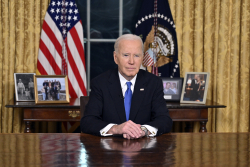
The Supreme Court’s 2023 Students for Fair Admissions v. Harvard decision ruled that racial preferences in university admissions are unconstitutional. Since that decision, universities have used applicants’ personal essays about discrimination as a backdoor way to continue racial favoritism.
The federal government is following their lead, using such essays to continue awarding tens of billions of dollars in contracts—involving everything from accounting software to the construction of naval ships—based on race. The federal essay program is an absurd way to determine who shapes American infrastructure and national defense.
Finally, a reason to check your email.
Sign up for our free newsletter today.
In recent decades, Washington has created several programs that give preferences in government contracts to businesses owned by “disadvantaged” individuals— typically a euphemism for racial minorities. Soon after the Harvard decision, a federal district court in Ultima v. Department of Agriculture ruled that the government could no longer presume that racial minorities were eligible for the largest contracting program, 8(a) of the Small Business Act, which allows “socially and economically disadvantaged” businesses to get federal contracts with limited or no competition.
Since federal contracts totaling $25 billion were awarded through the 8(a) program in 2023, the Ultima ruling caused a “full-blown panic,” said one attorney who helped businesses get such contracts. To keep the program going, the Small Business Administration (SBA) asked business owners to write “social disadvantage narratives” to show that they suffered discrimination and thus needed extra help from the government. The SBA hired additional workers to review the resulting onslaught of essays.
The SBA recommends that business owners write about their race, ethnic origin, sexual orientation, or other “identities/characteristics” that have led them to suffer discrimination. Applicants should “provide two incidents of bias” from their past that show how discrimination affected their education or careers. “To avoid unnecessary delays to the review process,” the SBA recommends not sharing more than two.
How can someone show that he suffered enough discrimination to deserve, say, a contract for road repaving? The SBA says that a business owner can discuss “social patterns or pressures which discouraged the individual from pursuing” certain educational or work opportunities. These might be as vague as some stray comments. The SBA suggests other potential incidents of discrimination, such as a minority business owner being denied a line of credit that he felt he deserved, leading to the supposed conclusion that “[t]he bank and its employees must have arbitrarily set higher standards for business owners and borrowers of color.”
Earl Stafford Jr. is an 8(a) contractor who, after the Ultima ruling, had to write an essay to reapply. The Washington Business Journal reported the “painstaking” ordeal, whereby he had to dredge up some non-specified “incidents of discrimination” during his school years that supposedly shook his confidence and made him think that, as a black man, he did not have “what it took to be in business.” His lack of confidence might be surprising, considering that his father, Earl Stafford Sr., founded a wildly successful defense firm that was sold to Lockheed Martin, providing him with enough funds to start his own private foundation.
Businesses have sprung up to help individuals with their discrimination narratives. The firm Schoonover and Moriarty instructs potential clients, “Dig deep. Did something happen to you that has never felt right? . . . Was there a racial/heritage/religious component to what happened? Maybe you’ve always wanted to believe that there wasn’t—but there was.” The firm Theodore Watson & Associates reminds clients that, though they should describe specific incidents, they “are not required to convince the SBA that an incident was motivated by bias.” The SBA does not seem to check on the truth of accusations, either.
Curtis Joachim was a longtime 8(a) member and accountant who had to reapply to the program with a disadvantage narrative. Joachim wrote about how he didn’t qualify for a Marine officers training program and promotion—and thus, his “lifelong dream . . . was crushed because of the color of my skin.” The Washington Post noted that, though it “had not occurred to [Joachim] to blame racism” on this or other troubles in the past, the essay process made him see his reported incidents as “the tip of the iceberg as to the racism and social disadvantage I have faced in this country from the early days of my youth.” The Post reporter interviewed friends of Joachim who noted that it was unlikely anyone in his position would have received the promotion.
The Supreme Court and the public have paid less attention to racial contracting programs than other types of affirmative action. That the U.S. government is now encouraging not just 18-year-old students but successful business owners to see their nation as incorrigibly racist has largely escaped discussion. Sooner or later, though, Americans will have to decide if we want to choose the providers of everything from our highways to national defense based on merit—or personal essays.
Photo by ANDREW THOMAS/Middle East Images/AFP via Getty Images
City Journal is a publication of the Manhattan Institute for Policy Research (MI), a leading free-market think tank. Are you interested in supporting the magazine? As a 501(c)(3) nonprofit, donations in support of MI and City Journal are fully tax-deductible as provided by law (EIN #13-2912529).
Source link

















